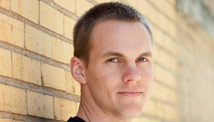deep
Blue Crack Addict
It’s just not the same as the American Dream.
My take: Why my church rebelled against the American Dream – CNN Belief Blog - CNN.com Blogs
I no longer believe in religion.
I do believe in being kind and charitable towards others.
My take: Why my church rebelled against the American Dream

Editor’s Note: David Platt, Ph.D., is the author of the New York Times bestseller Radical: Taking Back Your Faith from the American Dream and is senior pastor of the 4,000-member Church at Brook Hills in Birmingham, Alabama.
By David Platt, Special to CNN
We American Christians have a way of taking the Jesus of the Bible and twisting him into a version of Jesus that we are more comfortable with.
A nice middle-class American Jesus. A Jesus who doesn’t mind materialism and would never call us to give away everything we have. A Jesus who is fine with nominal devotion that does not infringe on our comforts.
A Jesus who wants us to be balanced, who wants us to avoid dangerous extremes, and who for that matter wants us to avoid danger altogether. A Jesus who brings comfort and prosperity to us as we live out our Christian spin on the American Dream.
But lately I’ve begun to have hope that the situation is changing.
The 20th-century historian who coined the term “American Dream,” James Truslow Adams, defined it as “a dream… in which each man and each woman shall be able to attain the fullest stature of which they are innately capable, and be recognized by others for what they are.”
But many of us are realizing that Jesus has different priorities. Instead of congratulating us on our self-fulfillment, he confronts us with our inability to accomplish anything of value apart from God. Instead of wanting us to be recognized by others, he beckons us to die to ourselves and seek above all the glory of God.
In my own faith family, the Church at Brook Hills, we have tried to get out from under the American Dream mindset and start living and serving differently.
Like many other large American churches, we had a multimillion-dollar campus and plans to make it even larger to house programs that would cater to our own desires. But then we started looking at the world we live in.
It’s a world where 26,000 children die every day of starvation or a preventable disease. A world where billions live in situations of such grinding poverty that an American middle-class neighborhood looks like Beverly Hills by comparison. A world where more than a billion people have never even heard the name Jesus. So we asked ourselves, “What are we spending our time and money on that is less important than meeting these needs?” And that’s when things started to change.
First we gave away our entire surplus fund - $500,000 - through partnerships with churches in India, where 41 percent of the world’s poor live. Then we trimmed another $1.5 million from our budget and used the savings to build wells, improve education, provide medical care and share the gospel in impoverished places around the world. Literally hundreds of church members have gone overseas temporarily or permanently to serve in such places.
And it’s not just distant needs we’re trying to meet. It’s also needs near at hand.
One day I called up the Department of Human Resources in Shelby County, Alabama, where our church is located, and asked, “How many families would you need in order to take care of all the foster and adoption needs that we have in our county?”
The woman I was talking to laughed.
I said, “No, really, if a miracle were to take place, how many families would be sufficient to cover all the different needs you have?”
She replied, “It would be a miracle if we had 150 more families.”
When I shared this conversation with our church, over 160 families signed up to help with foster care and adoption. We don’t want even one child in our county to be without a loving home. It’s not the way of the American Dream. It doesn’t add to our comfort, prosperity, or ease. But we are discovering the indescribable joy of sacrificial love for others, and along the way we are learning more about the inexpressible wonder of God’s sacrificial love for us.
Now, don’t get me wrong. I love my country and I couldn’t be more grateful for its hard-won freedoms. The challenge before we American Christians, as I see it, is to use the freedoms, resources, and opportunities at our disposal while making sure not to embrace values and assumptions that contradict what God has said in the Bible.
I believe God has a dream for people today. It’s just not the same as the American Dream.
I believe God is saying to us that real success is found in radical sacrifice. That ultimate satisfaction is found not in making much of ourselves but in making much of him. That the purpose of our lives transcends the country and culture in which we live. That meaning is found in community, not individualism. That joy is found in generosity, not materialism. And that Jesus is a reward worth risking everything for.
Indeed, the gospel compels us to live for the glory of God in a world of urgent spiritual and physical need, and this is a dream worth giving our lives to pursue.
The opinions expressed in this commentary are solely those of David Platt.
My take: Why my church rebelled against the American Dream – CNN Belief Blog - CNN.com Blogs
I no longer believe in religion.
I do believe in being kind and charitable towards others.





